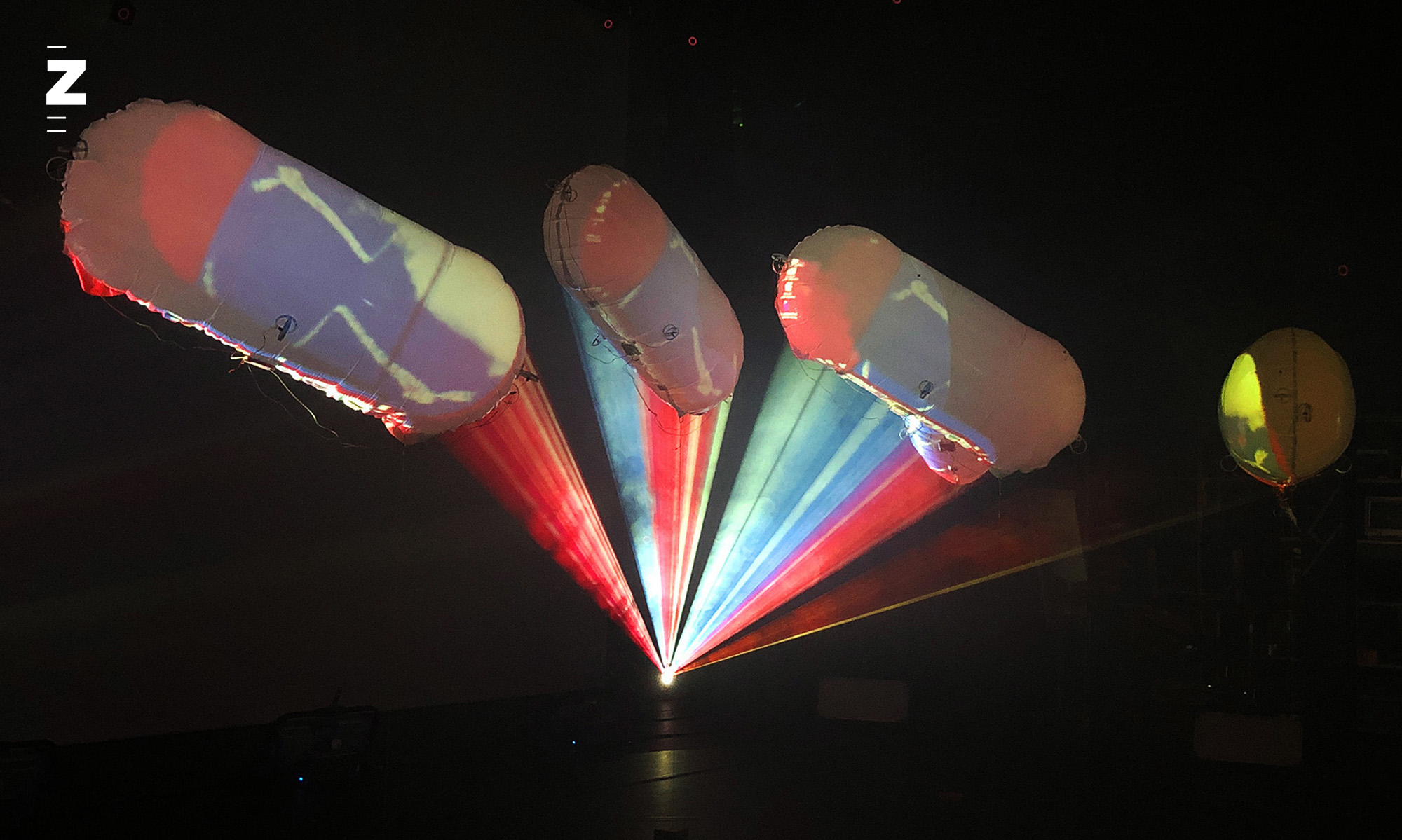As a hub for research-creation, the Immersive Arts Space tackles a multifaceted challenge by pursuing and promoting an integrated program of transdisciplinary inquiry in and across research, teaching, service and production. The team members have their professional roots in film, game design, interaction design, music, computer science and engineering, and often members have a background in more than one discipline. The IASpace is part of the research cluster of the Digitalization Initiative of the Zurich Higher Education Institutions (DIZH).
Probing XR’s Futures: Opening Workshop
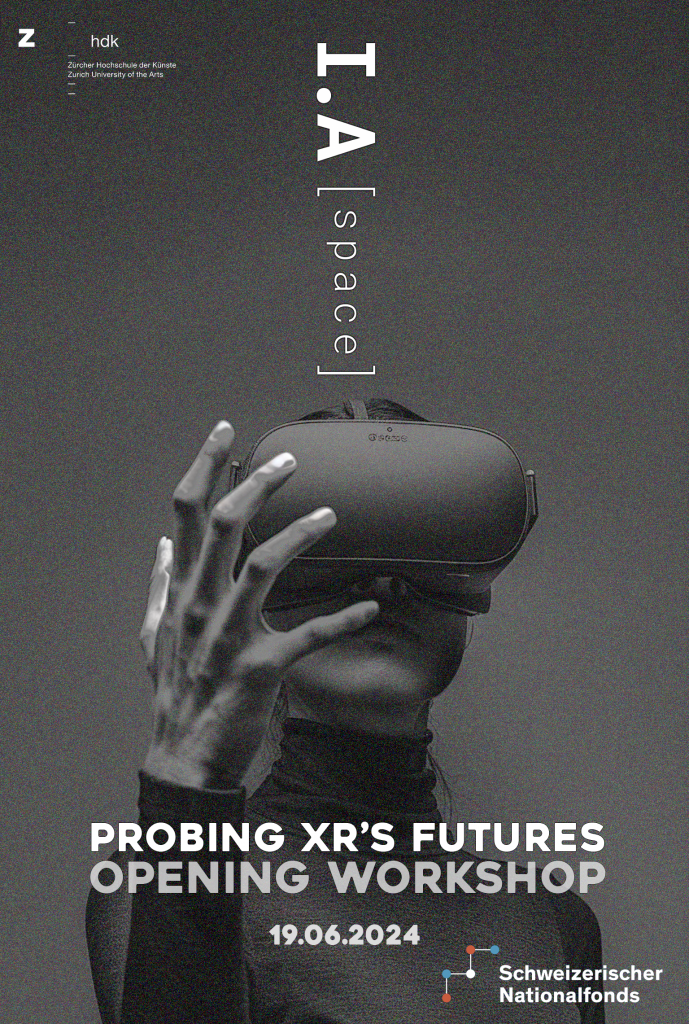
“Extended reality” (XR) devices like Apple’s recently announced Vision Pro or Meta’s Oculus Quest 3 enable new possibilities for mixing the real world with a computationally generated one, promising to “change interaction as we know it.” What are we to make of this claim?
To tackle this question, Probing XR’s Futures brings together designers, scholars, artists and curators during a 4-year SNF-funded research project. Its opening workshop on Wednesday, 19 June 2024, will bring together project partners, collaborators, and interested researchers at the Immersive Arts Space to take a first stab at core issues relating to XR from contrasting perspectives. These perspectives include design fiction, sensory ethnography, video analysis, critical disability studies, STS and more.
The opening workshop at the IAS offers an apt opportunity to engage interdisciplinary conversation on design fiction, bodily experience, and critical inquiry, while providing a forum for instructive exchange between upcoming scholars and established researchers. Confirmed participants include Sabine Himmelsbach (HeK Basel), David Howes (Concordia), Lorenza Mondada (Basel), Pilar Orero (Barcelona), Andreas Uebelbacher (Zugang für Alle, Zurich).
Workshop participation is upon invitation. For those interested in joining, please contact Joëlle Kost at IAS.
Where: ZHdK | Immersive Arts Space | 1.J30
When: 19.06.2024
Probing XR’s Futures. Design Fiction, Bodily Experience, Critical Inquiry
Swiss National Science Foundation (SNSF) project, 2023-2027
“Extended reality (XR) devices like Apple’s recently announced Vision Pro or Meta’s Oculus Quest 3 enable new possibilities for mixing the real world with a computationally generated one, promising to “change interaction as we know it.” Yet, there is little research on exactly how XR might reshape bodily subjectivity and experience. Probing XR’s Futures utilizes a critically-historically informed, practice-based design approach to examines how XR technologies reimagine bodily subjectivity, interaction and experience, on the one hand, and how bodily experience could reimagine XR, on the other. The 4-year project employs critical, creative, conceptual and empirical approaches to address three questions: How is everyday interaction in XR achieved? How will XR change interaction and what social reciprocity and mutual access will be enabled? What concrete effects and forms of discipline will be enacted on disabled bodies interacting in XR? The objective is to use design fiction, a design research method that prototypes objects and scenarios to provoke new ways of thinking about the future, as a form of critical inquiry to probe the present and future of social interaction in XR in three different settings and contexts: the lab, public space and in collaboration with disabled researchers and communities. Situated at the Immersive Arts Space at the Zurich University of the Arts, the project is at the interdisciplinary intersection of Critical VR studies, Science and Technology Studies (STS) and experimental media design. It will constitute one of the first in the context of Swiss and German speaking design research to develop alternative thinking and experimental aesthetic-design analysis, reflection and critique of XR directly in situated action and use with the general public.
Team:
Christopher Salter (Project Lead)
Philippe Sormani (Senior Researcher)
Puneet Jain (PhD Candidate)
Chris Elvis Leisi (Researcher)
Oliver Sahli (Researcher)
Stella Speziali (Researcher)
Pascal Lund-Jensen (Researcher)
Project Partners:
Andreas Uebelbacher (Access for All Foundation)
John David Howes (Concordia University Montreal, Sociology/Anthropology)
Sabine Himmelsbach (Haus der elektronischen Künste Basel, HeK)
Pilar Orero (Universitat Autònoma de Barcelona, Transmedia Research Group)
Lorenza Mondada (Universität Basel, Institut für Französische Sprach- und Literaturwissenschaft)

Zurich Art Weekend @ Immersive Arts Space
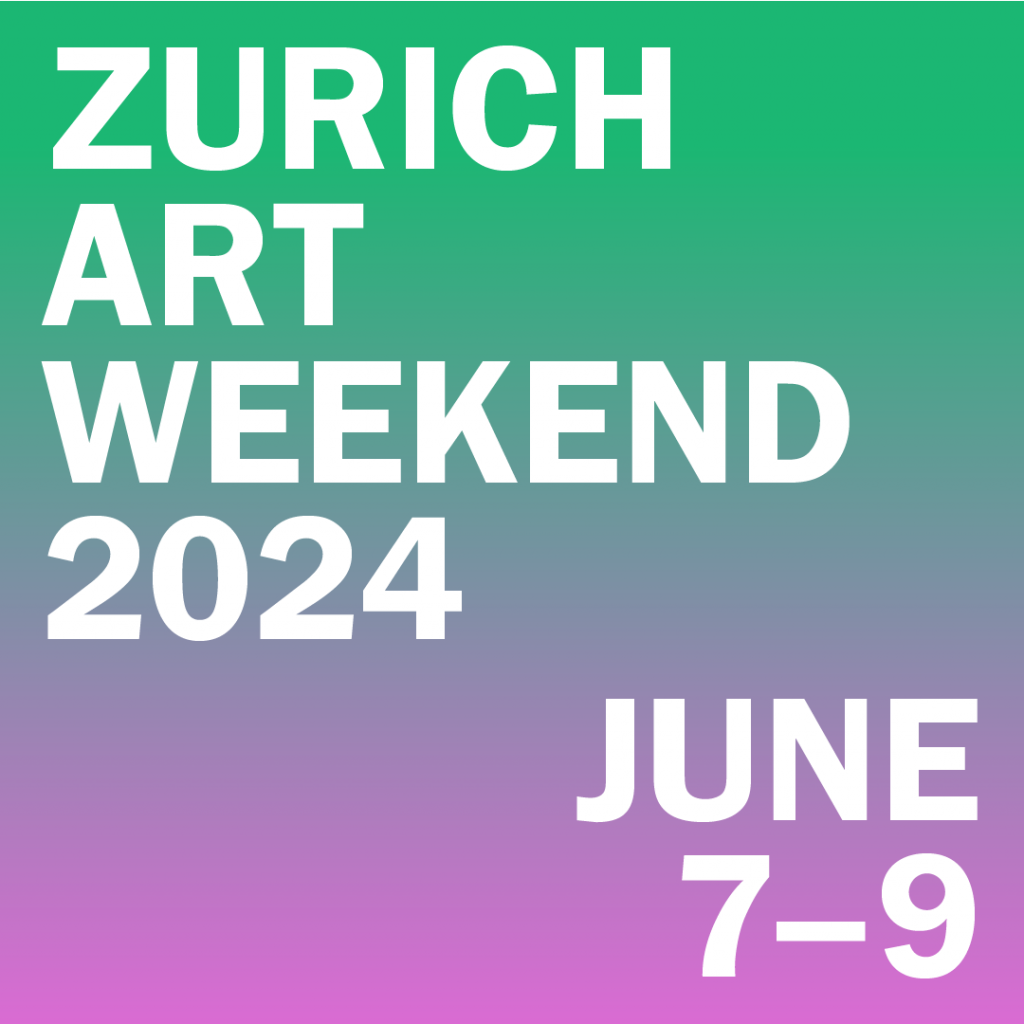
At the Zurich Art Weekend, the Immersive Arts Space will provide insights into two ongoing research projects that deal with the transfer of the visitor’s body into the digital domain in different ways. The multiuser mixed reality experience Doppelgänger invites visitors to a confrontation with their own self as a three-dimensional double in a real environment. In the installation A Hero’s Return, the viewers’ bodies provide the starting point for generative heroic images in real time.
When: 07.06.24 | 17:00 – 21:00
08.06.24 | 13:00 – 17:00
09.06.24 | 13:00 – 16:00
Where: ZHdK | Immersive Arts Space | 1.J30
Hero’s Return
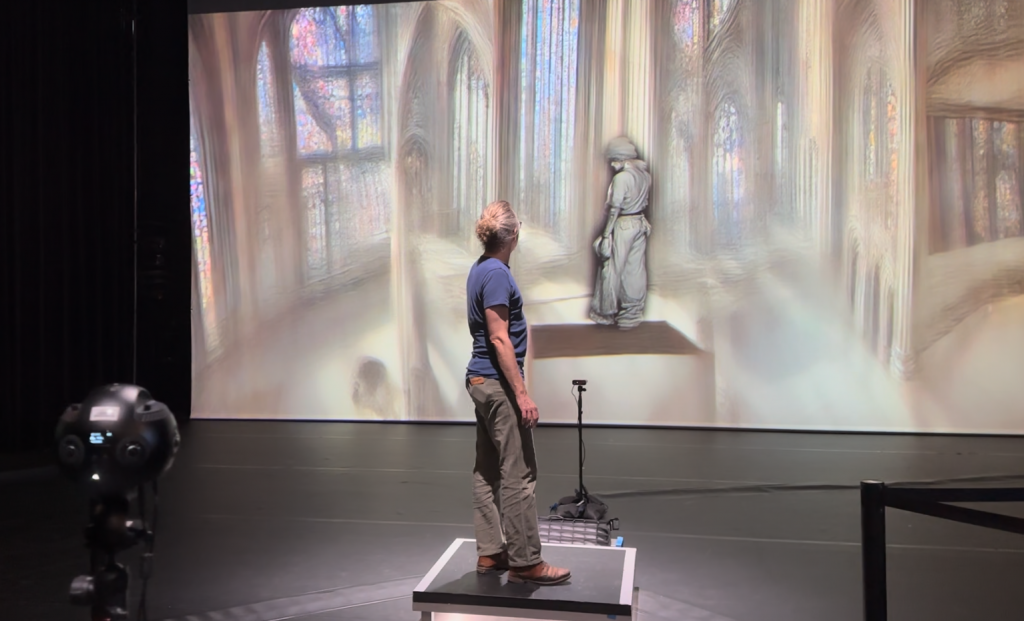
The interactive installation A Hero’s Return transforms visitors’ poses into a digitally generated alter ego. The creation of the character and its background is realized in real-time by artificial intelligence models. This installation prototype explores the capabilities of these models (such as Stable Diffusion) and focuses on the technical and aesthetic possibilities in combination with the performative interaction with visitors. The installation also incorporates popular film representation techniques: a virtual camera performs a circular tracking shot around the scanned visitor’s body, reminiscent of scenes from numerous action hero films.
Credits:
Artists: Martin Fröhlich, Stella Speziali
Thanks to: Ege Seçgin
doppelgaenger:apparatus
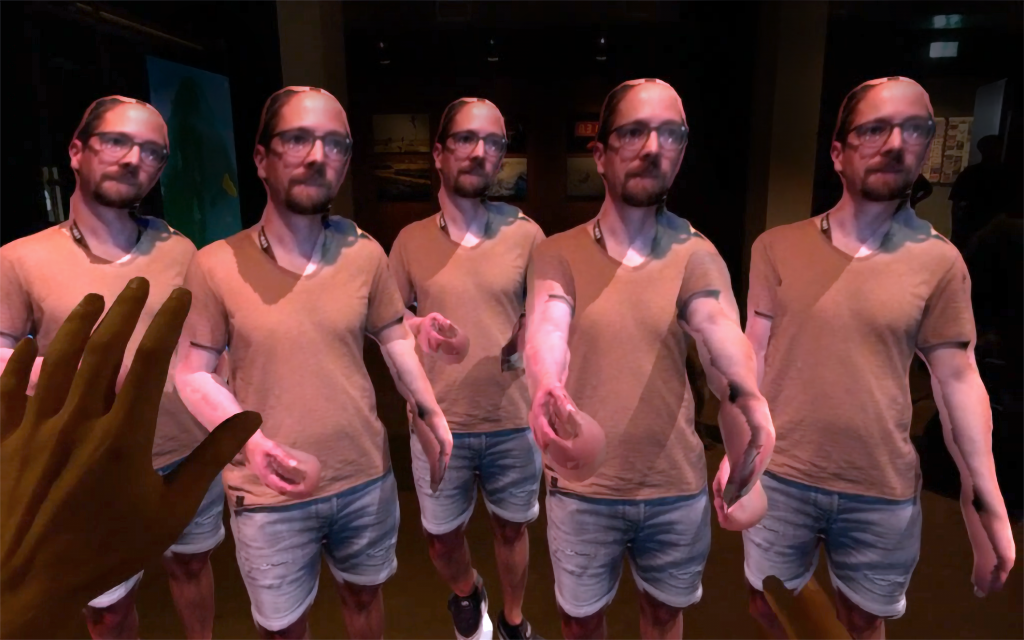
doppelgaenger:apparatus is a multiuser mixed reality experience that enables participants to confront their computer generated 3D doubles in a real physical surrounding. Enabled by a custom designed AI-based process, a frontal 2D image of the participants is taken and quickly transformed into an animated 3D reconstruction. From the moment the visitors put on the headset, they see the real environment captured by a camera on the headset. Gradually, this familiar space shfits, with the appearance of the visitors’ double standing before them. Co-present with other participants, visitors intimately interact with their ‘mirror image’ while observing and interacting with others doing the same. While at first the participants get the feeling of controlling their ‘mirror image’, this rapidly shifts as their doubles, free from the constraints of the original bodies, start to invade the participants’ personal space, leading to a disturbing and uncanny play between them. Historically, a doppelgänger was seen as a ghostly counterpart for a living person, seen as an omen or sign of death. Freud later argued that encountering one’s double produces an experience of “doubling, dividing and interchanging the self.” This installation thus takes the next step in exploring how new digital sytems increasingly produce uncanny tensions between our bodies and their captured other.
Credits:
Artist and Development: Chris Elvis Leisi
Artist and Sound: Christopher Lloyd Salter
Machine Learning: Florian Bruggisser
Past exhibitions:
MESH Festival, 16. to 20. October 2024 at HEK in Basel. More information [here]
REFRESH x FANTOCHE, 04.-08. September 2024
Residencies at Immersive Arts Space
The Immersive Arts Space, in collaboration with other institutions and departments of the ZHdK, offers residency opportunities to artists and researchers. Current calls for proposals, as well as current and past collaborations, can be found here.
BODIES-MACHINES-PUBLICS
A glocal network exploring bodies in the age of computer mediated reality
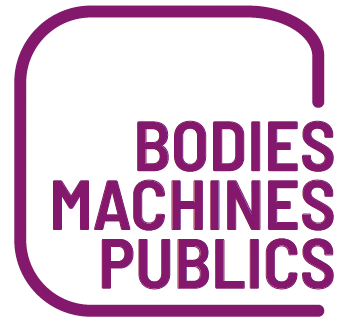
BODIES-MACHINES-PUBLICS brings together a “glocal” (global and local) network of cultural and research partners in Switzerland, India and Chile that seek to provide time and space for artists to develop prototypes and works exploring the sensitive body and technical mediation in relation to public space. The project is a two-year collaborative initiative between NAVE (Chile), KHOJ Studios (India), Immersive Arts Space/ZHdK (Zurich, Switzerland) and Kornhausforum (Bern, Switzerland) and is supported by the Pro Helvetia Synergies Program.
People increasingly interact with technologies such as wearable sensors, VR/AR headsets or other data gathering systems on an intimate, bodily level which successfully blurs the lines between the physical and the digital; the body and its interaction with its environment. At the same time, the involuntary data collection and machine-led decisions that arise from these sensing technologies exacerbates historical inequalities, particularly affecting marginalized groups. Addressing the capture of human motion, thoughts and experience through new technologies is therefore an ongoing challenge that requires new kinds of creative and imaginative practices.
Residency 2025
Open Call for Residency at Immersive Arts Space and Kornhausforum
BODIES-MACHINES-PUBLICS invites Indian and Swiss visual, performing and media artists, designers, architects or researchers working between art, technology and science to apply for a shared residency at the Immersive Arts Space and Kornhausforum Bern in Switzerland. Artists can apply through an open call until 13th April 2025. The residency will last four weeks, two weeks in each institution (Immersive Arts Space and Kornhausforum) between 8th September to 5th October 2025. The aim of the residency is to develop prototypes and works that can be publicly exhibited.
The deadline for application has ended.
Open Call for Residency at NAVE

Residency 2024
The project starts this year with the combined residencies at the Immersive Arts Space and Kornhausforum. The two part residency starts on 9th September at the IAS and moves then into the Kornhausforum until 5th October 2024, where there will be a public presentation of the projects. Two artists – one from Switzerland, and another one from Chile – will share the spaces and work on their projects with the aim to exchange artistically as well as culturally.
The Swiss artist is Ludovica Galleani d`Agliano, who graduated in 2023 from Interaction Design (ZHdK) with her project Syntia_CAM. In the month long residency she aims on developing Syntia_CAM into a live performance and therefore interactive installation between the main characters and audiences.
Javier Muñoz Bravo is a composer within the field of instrumental and electronic music. Javier was trained at The University of Chile (Santiago) and Institut de recherche et coordination acoustique/musique (Ircam) in Paris. Today, Javier is based in Paris and works together with choreographer Stefanie Inhelder and the cie glitch company creating immersive dance performances. During the residency the duo will develop Une saison en métavers – an immersive piece, with a female singer in combination with AI driven visuals, motion capture and live electronics.
https://javiermunozbravo.com/
G.–Ai performance by Victoria Cheredeeva
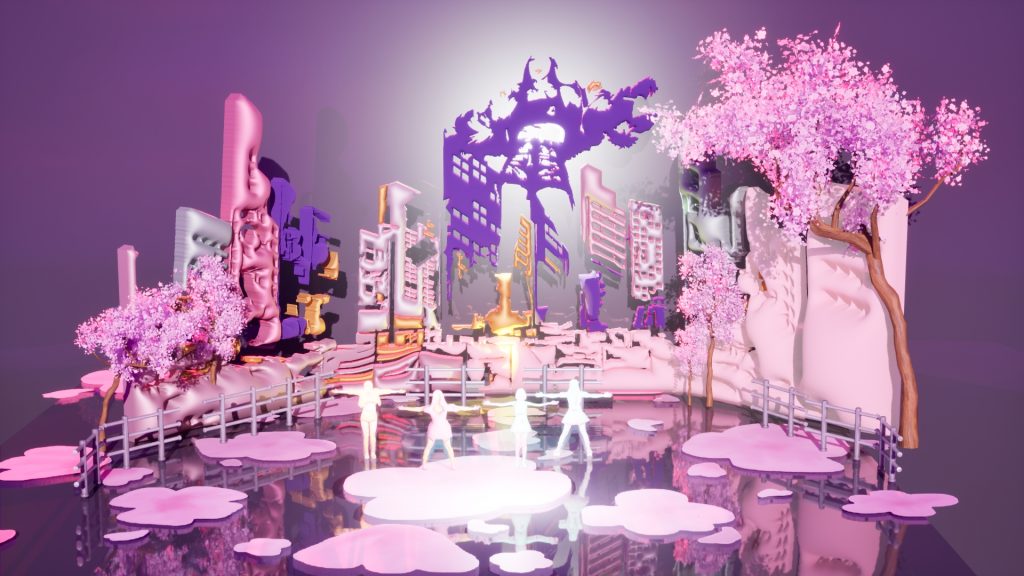
The digital world is a place where reality collapses, and it seems that everything is possible. Become an idol and perform in front of an audience, where the avatar you created transforms the space into a brilliant show—an attempt to create a digital realm where everyone can be an idol, no matter the limits. “G.–Ai performance” uses constructed narratives in the idol industry and tries to reinvent and deform them.
When: June 5, 2024 | 18:00 and 18:30
Where: ZHdK | Immersive Arts Space | 1J.30
Credits:
Claudio Linares Burbat (composer and producer)
Antonia Orfanou (cartographer and performer)
Lea Bishoff (singer)
Alberto Mancini (audio engineer)
Stella Speziali (Immersive Arts Space support)
The performance is part of Victoria’s diploma project for her Master in Interaction Design at ZHdK.
